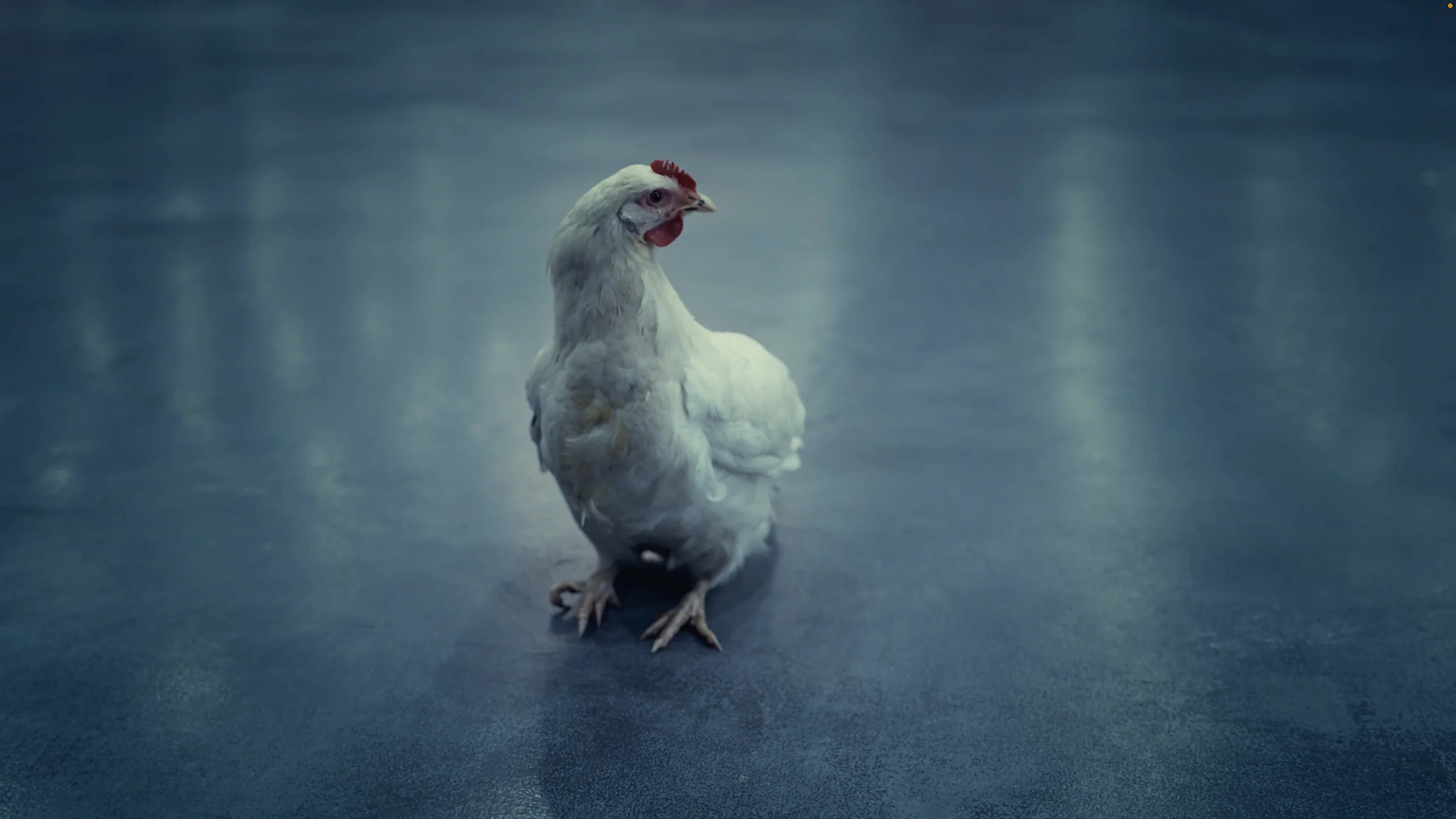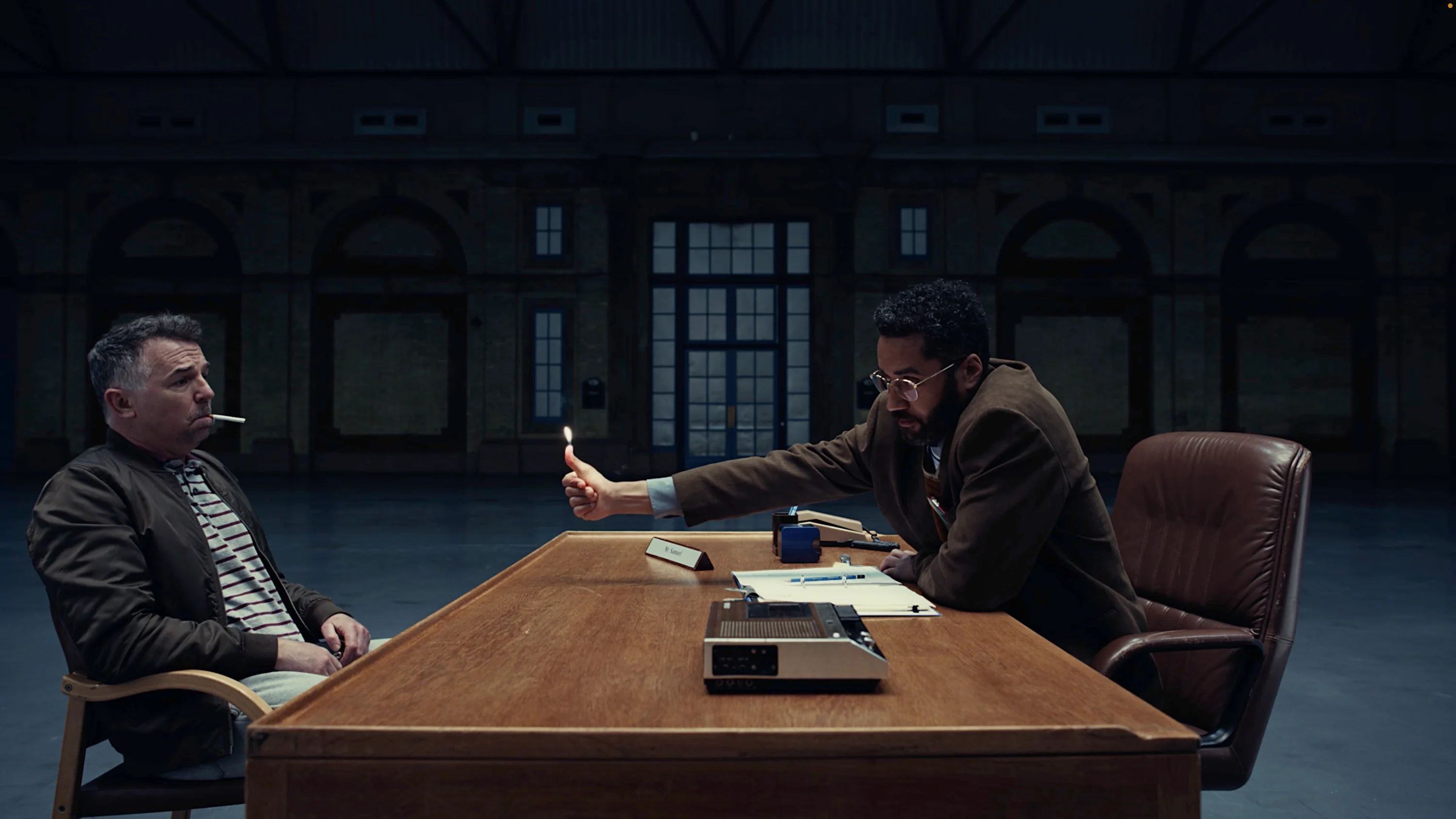
Director Rob Leggatt has long been inspired by the long catalog of mid-century British films that dealt with the surreal and the magical, with the universal hope for an afterlife of some kind, but he’s always wanted to explore what would happen if the character at the center of these stories was a regular bloke. He tells Sam Diss how his short film “Meeting Mr Samuel,” co-released with Minute Shorts, offers a new perspective on the afterlife, stemming from the question: “What happens to a geezer in heaven… or in hell?”
“How does the man from Wetherspoons react when he finds himself in the afterlife?” says director Rob Leggat. “That was my starting point: What happens to a geezer in heaven… or in hell?”
His new short film “Meeting Mr Samuel” runs with that telling question. Charlie, a deadbeat dad with a talent for wasting time, is hiding out in a pub bathroom instead of picking up his kids and collapses in the bathroom after a line of coke hits him the wrong way. He wakes up in “the basement”—Leggatt’s rebrand of hell. But instead of red blokes with goatees and flaming pitchforks, eternity looks like an empty school hall, the buzz of fluorescent lighting overhead, Beelzebub’s bureaucratic receptionist left to do the paperwork, here presented in the shape of Mr Samuel, Charlie’s old geography teacher. Our recently-deceased protagonist’s crimes are pretty minor in the grand scheme, but here, the punishment fits: he’s wasted his life, so now he’s going to waste his afterlife too.
“It’s the idea that you get the hell you deserve,” Leggatt says. “Charlie’s not an evil person, he’s just a waster. So his hell is being stuck with his geography teacher forever. It’s basically detention for eternity.”

You wouldn’t want to be married to him—or stuck in a hall for all time with him—but most of us have known someone of Charlie’s silhouette. Just one of those men you half-recognize in the corner of the pub, an old schoolmate who’s squandered too much time, grown estranged from his partner, who probably knows his dealer better than his daughter’s teacher. But still, somehow, there’s a wiry wit to him, a hint of the charm that once carried him through.
“He’s angling to engineer his escape,” Leggatt says, “realizing that this person guarding him might be just as bored as he is... But Charlie’s reason for wanting to escape is that he’s realized he’s fucked it up and he wants to get back and put it right. He wants to be a better dad.”
Still, when Charlie hits his inevitable breaking point—his bottom lip wobbling, tears pooling in his eyes as he runs through a laundry list of fuck-ups and let-downs, usually a narrative’s moment-of-clarity turning point—he’s gagged by his eye-rolling overseer. It’s played as black comedy, but the humor sits on top of something sadder: the fantasy of a second chance, the knowledge it will probably never come… Unless you’re willing to debase yourself.
That was my starting point: What happens to a geezer in heaven… or in hell?
To Leggatt, the film is pitched as “Powell & Pressburger’s ‘A Matter of Life & Death’ but in Wetherspoons”—part of a lineage he traces back to mid-century British cinema. “I think there used to be a seam of English films which dealt with the surreal and the magical,” he says. “And I’ve always loved those movies. A lot were made during and after World War II, dealing with the afterlife and a hope for the afterlife, because obviously lots of people were dying… They were pumping out these films to make people feel better about the fact that they’d lost husbands and sons on a massive scale.”
But Leggatt isn’t offering comfort. “Meeting Mr Samuel” is more interested in class and perspective. It asks what happens when ordinary people are thrown into situations with cosmic proportions. “In films like this—fantasy, science fiction—they’re always scientists or fucking theologians or whatever. It never just happens to a normal person,” Leggatt says. “I’m a working-class lad who worked on building sites before getting into film, and I’ve known a lot of blokes like Charlie. So I thought: What happens when it’s their turn?”

He’s realized he’s fucked it up and he wants to get back and put it right. He wants to be a better dad.
Despite the film’s portentous premise, the origins of the idea were decidedly more down to earth. Picture it: Lockdown, garden shed, Rob wheezing on his exercise bike. “I was pedaling away and thought, What would happen if I just had a heart attack here? What if I woke up, and the afterlife just looked like the garage?” At first, he thought he’d shoot it small, maybe just on his iPhone. “Then, as always,” he adds, “it spiraled.”
This particular spiral took him all the way to Alexandra Palace, the legendary event space in North London, where he hired one of its vast halls to stage Charlie’s banal netherworld. “I probably could’ve just shot it in an actual school hall, but sometimes, once you get going, it’s almost like a mania that takes over,” he says, laughing. “I started with: I’ll make a cheap short in my garage. Then I ended up writing a check to Ally Pally for thousands of pounds… And you start thinking: What the fuck am I doing?”
In films like this, they’re always scientists or fucking theologians or whatever. It never just happens to a normal person.
For Leggatt, that process is instructive, and he doesn’t mind what shape the journey takes as long as he ends up with something to show for it. “If you look at the artists I admire—Neil Young, for example—they just make a lot of stuff,” he says. “Some of it’s great, some of it’s really shit. But you build a body of work. And that’s what it’s all about. The first draft of anything you write is always going to be shit. The important bit is you just keep going.” That’s the real lesson he wants young filmmakers to take: Don’t wait for permission. Stop trying to polish until it gleams. Just go and make what pops into your head.
It’s a perspective shaped not by film school but making music videos and commercials, where you quickly learn to work with what you’ve got. Early in Leggatt’s career as a runner making teas on set, that meant borrowing cameras on weekends, sneaking into edit suites after hours. Now, it means spending his own money on shorts that may not ever recoup. “When you’re paying for it yourself,” he says, “I guess it’s the ultimate test.”
Over two decades into his career, Leggatt is clear-eyed about where he fits. With AI now able to create the glossy lifestyle filler—cars on rolling hills, perfect couples in perfect kitchens—that market “is really going to suffer,” he says. “So why set yourself up for failure?
What machines can’t do is what keeps him working: the off-beats, the wrinkles, the human insight that sends daft ideas that start on a Post-it or a sweat-splattered exercise bike in the garden shed spiraling into something unmanageable and imperfect but refreshingly real.
“There’s literally no excuse for me to sit at my desk and go: Oh, I don’t know what I’m going to do next,” he says. “All I have to do is just walk down the shed now and start making another film. Because the regret of not doing it will make you feel worse than the feeling of doing it when you don’t want to.”

